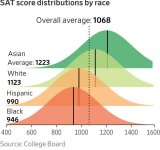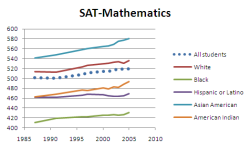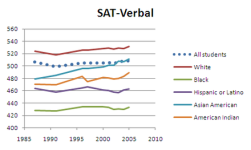Derec
Contributor
Well racial preferences sure help. But, the notorious ACB may help fix that soon.I'm not too concerned about it though. Many black people do just fine with or without SAT and other tests.
Huge exaggeration, but I admit a sizable minority of my posts did include black people. Given how many news stories involve them (especially during the monthslong 2020 riots) is it a surprise or in any way different from most other posters?Some even manage to succeed without graduating Highschool (said while whisking dust off my shoulder). The efforts made towards inclusion have me slightly at ease. I mean look, even Derec gets it, he includes my people in almost all of his posts.
A good trend for sure. The difference is still very large.Anyhow, anyone looking at the bigger picture as far as statistics go can see a gradual improvement in Black SAT scores VS White.

Not quite true.Overall White SAT scores have neither increased nor decreased over the same amount of time that Black SAT scores have been on the increase.


There is no "white privilege" in college admissions. There is a lot of black and hispanic privilege, euphemistically called "affirmative action".Which in my opinion shows black people are working on it while Asians are kicking yall asses for just doing the bare minumum VIA "white privilege".
If I was white I'd want to work on doing away with privilege cause it's clearly making yall dumber (look at your recent choices in political leadership vs back in the "good ole days"). Yall had some truly educated folk (despite them being slave-owning cock buffers).
Dude, you have a lot of hatred for white people. Not healthy for you dude.
